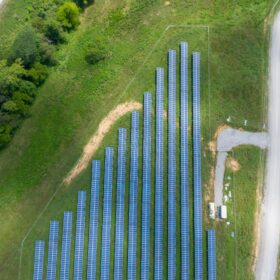Origami Solar, based in Bend, Oregon, was awarded the grand prize in the 2022 U.S. Department of Energy’s American-Made Solar Prize competition, recognizing the disruptive value and market potential of the company’s steel module frame.
The patent-pending steel frame is said to lower cost and improve module performance. The company reports that the frames are made of “green” recycled steel, thereby reducing greenhouse gases by up to 93%, representing a reduction of 80 kg per module or 200 metric tons per MW.
Origami Solar was founded by Eric Hafter and Jack Patton to try to bring innovation and cost reduction to solar module production. The founders noticed that in 20 years, the cost of other module components had come down but not that of the aluminum frame, which had become a significant part of the cost. According to Bloomberg New Energy Finance (BNEF), the aluminum frame costs roughly 2.23 cents per watt based on a total cost of 8.9 cents per watt for everything except the cell, with the frame representing 25% of the cost.
Hafter and Patton were also concerned about the greenhouse gases that result from aluminum manufacturing, so instead they looked at recycled steel. According to Origami Solar, using aluminum for module frames contributes more than ten times the greenhouse gas (GHG) emissions than its steel frames. The company said emissions are 14 kg of per 1 kg of aluminum, whereas steel production results in about 1.2 kg of GHGs for every 1 kg of steel. Recycled steel produces even less GHGs.
“Our Gen 2 frames are lighter, stronger and ideally suited to provide superior support to the new large-format modules coming to market,” said Gregg Patterson, CEO of Origami Solar. “In collaboration with steelmakers and precision roll formers, we have designed the Origami steel module frame to match the fit, form and function of industry-standard frames, making the transition from aluminum to steel seamless for module manufacturing and field installation.”
After working on the process for 12 years, Origami developed a patent-pending frame design that is manufacturable using a steel roll forming process. The company reports that the frames meet structural requirements and have a projected module lifespan of 30 years.
The second-generation frames are undergoing tests by third-party labs and module manufacturers and are now available for evaluation testing by module makers and key partners.
“Our goal throughout this process has been to support Origami Solar to ensure that any solar panel producer will be able to rapidly integrate and scale these frames with virtually no changes to their production processes, in both the U.S. and Europe,” said Thomas Welser of Welser Profile, a global manufacturer of roll-formed steel products. “Together with Origami Solar we have optimized the design and are working on further innovations that will address future industry needs.”
Origami Solar is sourcing steel and plans on producing frames regionally, thus eliminating supply chain constraints. The company reports that the frames are 100% U.S. made and will enable solar modules to qualify for the bonus tax credit.
“Steel is an earth-abundant resource that can be manufactured on every continent, the use of which in trackers, racking, mounts, and tubes is already widely accepted by the solar industry,” said Mathew Arnold, CEO of Unimacts, a Boston-based manufacturer with production facilities in Nevada, Mexico and Spain. “We are excited to collaborate with Origami Solar to rapidly facilitate the shift from imported aluminum to domestically made steel frames.”
This content is protected by copyright and may not be reused. If you want to cooperate with us and would like to reuse some of our content, please contact: editors@pv-magazine.com.









By submitting this form you agree to pv magazine using your data for the purposes of publishing your comment.
Your personal data will only be disclosed or otherwise transmitted to third parties for the purposes of spam filtering or if this is necessary for technical maintenance of the website. Any other transfer to third parties will not take place unless this is justified on the basis of applicable data protection regulations or if pv magazine is legally obliged to do so.
You may revoke this consent at any time with effect for the future, in which case your personal data will be deleted immediately. Otherwise, your data will be deleted if pv magazine has processed your request or the purpose of data storage is fulfilled.
Further information on data privacy can be found in our Data Protection Policy.